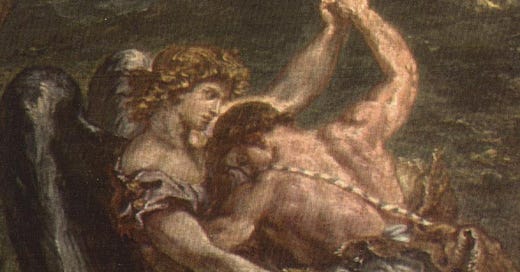As we saw in the last essay, our simple love of Crooked Tunes and the crooked in music brings us to a crossroads where unexpected paths of history and culture converge. Here’s another traveler you might meet there on some moonlit night.
In Passover: It’s History and Traditions, Theodor Herzl Gaster investigates an interpretation of the word Pesach (Hebrew for Passover). He relates it to the Hebrew word Pasach, which translates as limping.
This view stems from the fact that the Hebrew name for the festival, viz., Pesach, can also be derived from the word meaning "to limp." and that the performance of a limping dance happens to be a well attested feature of religious dance in both ancient and modern times.
Gaster cites some non-Jewish examples and then says that there may be some connection between Pesach and an earlier "Palestinean Spring festival."
So far, so good. But what's the connection between limping and Spring?
Gaster then ties limping to mourning and lamentation. "So much so that in Arabic and Syrian languages the term limp is a synonym for "mourn." He quotes the Arabist Edward Lane in his Manners and Customs of Modern Egyptians who says, "It is customary for the female relatives and friends of a person to meet together by his house and... there to perform a lamentation and a strange kind of dance... each dances with a slow movement and in an irregular manner generally pacing about raising and depressing the body." It's this raising and depressing that Gaster sees as limping. He also suggests this limping rhythm is present in ancient Hebrew dirges, (would be nice if there was a citation here.)
Ok, but why is he going on about lamentation? I thought this was about Spring? Gaster mentions that the funeral rites are not just for funerals, but were, as they are today, part of larger Spring fertility rituals.
Ancient and primitive peoples often represent the cycle of the seasons as the career of a god or spirit who dies annually... and is resurrected in the first flush of spring.
He then cites various examples of underworld descent/returns from many of the ancient neighbors to the Jews. Enough to say it was quite popular in the ancient Mediterranean.
Is Passover just a fertility festival then? No no no. Gaster isn't arguing anything that simple and history is never that “one to one.” He only suggests that this festival may be lingering in the form of a trace, or an echo, signified in the name.
[Conjecture alert: The Hebrew word avath, translated as "crooked," adds another level of meaning. It stresses the aspect of resistance, of even turning the normal order "upside down," (a common trope in anarchistic societies which we’ll explore in depth later). Another definition of avath is “to wrest." Is it also perhaps cognate with the Hebrew word for wrestling, ’avek or abak? The most famous wrestling match in the Bible, of course, features in the story of Jacob and the Angel. The result of Jacob's tussle with the Angel was a permanently damaged hip and a lingering limp. Wrestling with the angel is, like a trip to the underworld, contact with the other side.]
At this point, it would be helpful to recap.
1. Yes, it is clear limping was an important part of ancient dance, stretching from the source of the Nile to the hinterlands of Greece. We’re not just talking about something that looks funky, but something that is specifically related to being “lame” [I didn’t even talk about the culture of self-injury which is sometimes found with these dances.]
2. The Ancient Limp may have snuck into Jewish culture, albeit slightly, via the Spring holiday of Passover.
3. Most importantly, our affection, either conscious or un, for all things crooked in music, (Keil's idea of participatory discrepancies), now takes on an additional layer of meaning. The Crooked falls into a constellation that also ties together fertility, death and contact with the underworld and ecstasy. The exact relationship between these vectors is still unknown and cannot be reduced to a bumpersticker. It has to be felt, dreamt into, and re-explored with each performance. Which is, after all, the fun of it.






